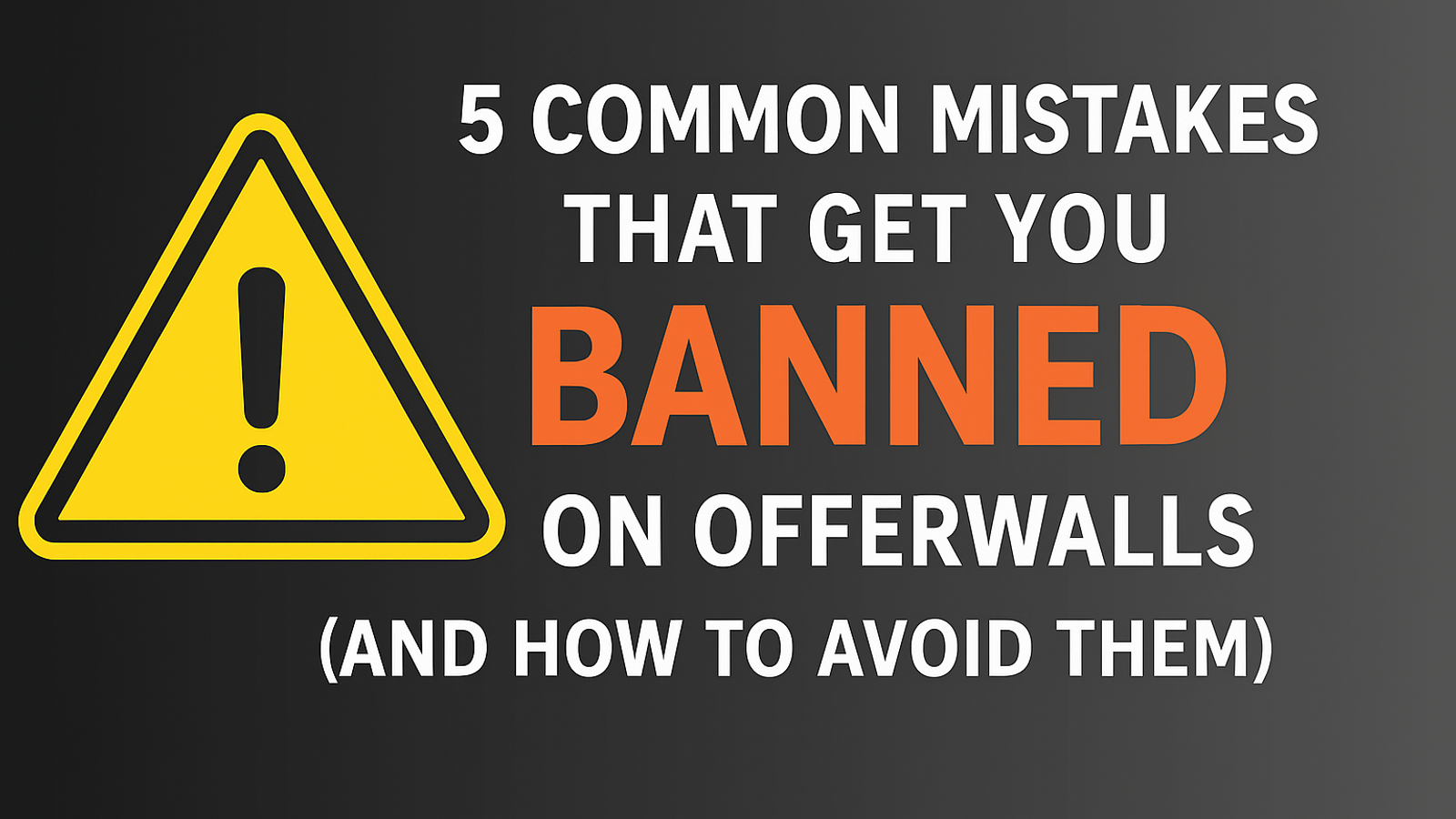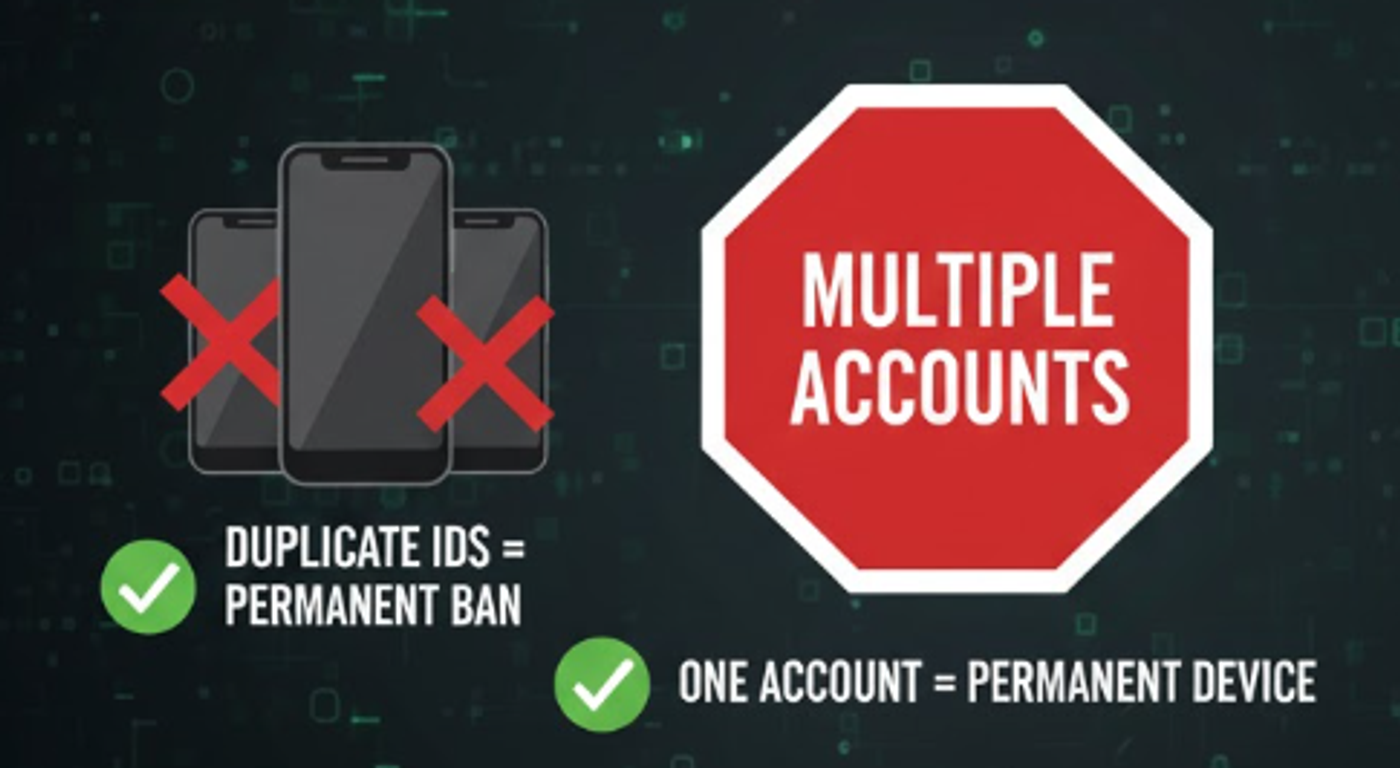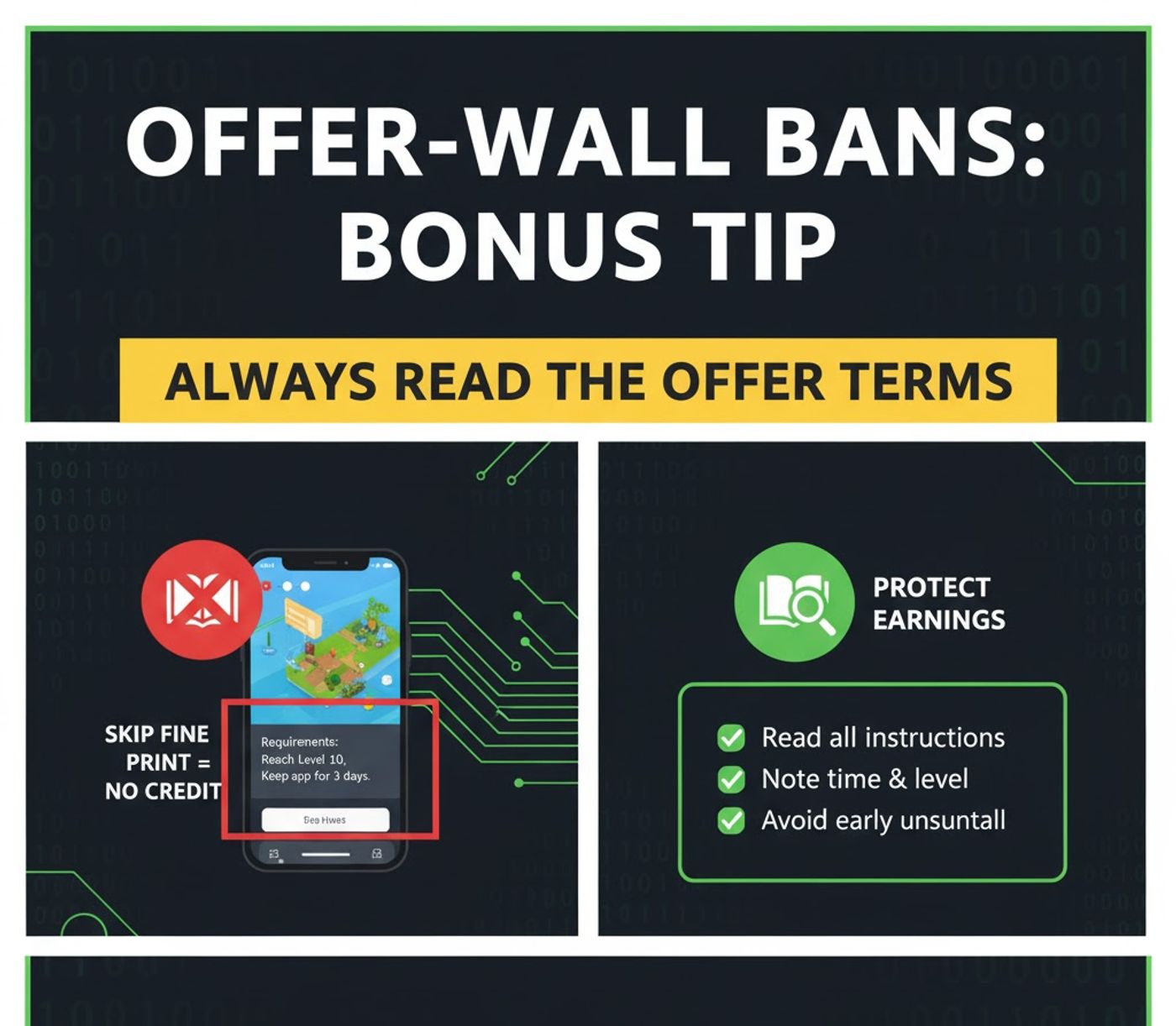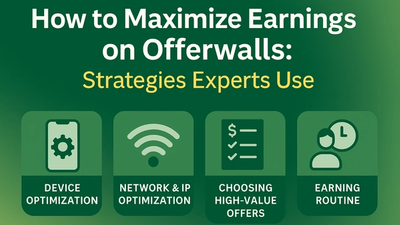5 Common Mistakes That Get You Banned on Offerwalls (and How to Avoid Them)

Ajeet Thapa

Introduction
You’re earning on offer-wall platforms: completing surveys, downloading apps, watching videos. But then suddenly your account is suspended, login blocked, or your balance disappears. Frustrating, right? The truth is: bans happen — even to honest users — and most of the time they’re triggered by avoidable mistakes.
In this post, we’ll walk through five real mistakes that offer-wall providers frequently flag. For each one, you’ll learn what goes wrong, why it matters, and exactly how to avoid it. Follow this guide and you’ll protect your account, safeguard your earnings, and keep earning online with confidence.
Mistake #1: Using VPNs or Proxies to Access Offers
What happens?
Many offer-wall services require you to complete offers based on your actual geographic region. If you use a VPN, proxy, or masking tool, your IP address may not match your account region — this triggers automated fraud detection. For example, the help-desk article for JumpTask states:
“Using a VPN or proxy while completing offerwalls is strictly prohibited… it may result in restrictions or penalties on your account.” JumpTask
Why it matters?
When an offerwall sees sudden changes (or masked) IPs it assumes you’re attempting to access geo-restricted offers, hide location, or bypass advertiser rules. According to Tapjoy support, offer credit «may be denied because you are using a VPN, proxy server, commercial network, or network that has been block-listed». Revu Help
How to avoid it?
1. Use your normal internet connection (home or mobile) — no VPNs/proxies.
2. Ensure your device’s region & IP match the country selected in your offer-wall account.
3. Don’t switch networks (public WiFi → home → VPN) mid-task: consistency matters.
4. If you travel or change location, update your region in the account (if supported) and avoid tasks until everything matches again.
Mistake #2: Running Multiple Accounts or Duplicate Device Access
What happens?
Offer-walls often enforce one-user-one-account policies. If you create multiple accounts (or use cloned apps, device emulators, same IP), you may trigger a ban. For instance, the FAQ of Multiple Accounts states that apps detect duplicate IDs, IMEIs or Device identifiers, and using those can lead to ban. multiple-accounts.zendesk.com

Why it matters?
From the advertiser’s point of view, multiple accounts from one user mean inflated conversions, repeat rewards, or fraud. The platform’s risk-team will flag this and may ban all associated accounts. A user may receive an error code 216 or similar — meaning the account has been permanently blocked. Revu Help
How to avoid it?
1. Use exactly one account per platform, per person.
2. Do not use the same device for multiple accounts — device IDs matter.
3. If family or household also uses the same reward site, inform support or use different networks/devices.
4. Avoid cloning apps or using “multi-account” tools as they leave digital fingerprints.
Mistake #3: Providing False or Inconsistent Survey Information
What happens?
Many tasks require you to complete a survey or fill demographic info. When your answers contradict earlier information (e.g., location, age, device type), the offer-wall detects inconsistency and may flag your account or deny reward. The help-center of CPIDroid lists this under “Offer completion but not credited” — reasons include suspicious change in country or device ID. cpidroid.com
Why it matters?
Advertisers rely on consistent audience targeting. If your survey data looks fake, your completion may be voided or your account flagged. Over time, repeated inconsistencies can lead to suspension. The help-desk of several offer-walls show that reward denial reasons include “You are not eligible” because of mismatched information. tapjoy.helpshift.com
How to avoid it?
1. Always use your real, consistent information when filling surveys (age, gender, country, job status).
2. Don’t change device region or reset advertising ID mid-task — the system tracks it.
3. Avoid rushing through surveys just to qualify — genuine responses increase trust.
4. Keep one account active; don’t switch accounts to bypass disqualifications.
Mistake #4: Completing Offers Too Quickly or Skipping Instructions
What happens?
Offer-walls track how long you spend on a task, whether you follow all steps (install → open → reach level → time spent). If you finish in an unusually short time, or exit the app prematurely, you risk reward denial or flagging. For example, Tapjoy’s FAQ states that if you “open the new app and immediately quit”, you might not get credited. tapjoy.helpshift.com

Why it matters?
Advertisers want real users to complete tasks meaningfully so their campaign is valid. If tasks are completed too fast or incompletely, the advertiser may mark it invalid — leading to account penalties. tapjoy.helpshift.com
How to avoid it?
1. Read each offer’s instructions carefully – note required actions and time-spent.
2. For game or app-install tasks: keep the app open, stay logged in, play required levels if needed.
3. Don’t immediately exit after install — wait until the tracking period completes.
4. Avoid automation, rapid clicks or skipping intent; behave like a regular user.
Mistake #5: Using Emulators, Automation Tools or Unsupported Devices
What happens?
Some reward seekers attempt to complete mobile-only tasks via emulators or use bots/scripts to automate task completion. These actions are easily detected: device fingerprinting, emulator signatures, and automated patterns. For instance, many FAQs list “Your device ID changed”, “you used multiple devices”, “you used VPN/proxy” as reasons for non-credit. cpidroid.com
Why it matters?
Using emulators or bots violates most offer-wall terms of service. When detected, not only is the task invalidated, but your account may be permanently banned. These tools are flagged under fraud prevention systems. Revu Help
How to avoid it?
1. Use real mobile devices only (Android or iOS) — no emulators.
2. Complete each task manually; avoid any auto-clickers or macros.
3. Avoid tampering with device identifiers or resetting advertising IDs.
4. If you switch device, make sure it’s registered and you didn’t leave the original unfinished task.
Bonus Tip: Always Read the Offer Terms Before Starting
This might feel obvious, but it’s easily overlooked. Many bans originate from users skipping the fine print: “Install and keep app for 3 days”, “Reach Level 10”, “Don’t uninstall before 48 hours”. These details matter. Offer-wall FAQ pages consistently mention that incomplete requirements lead to non-credit. tapjoy.helpshift.com

Conclusion
Being banned from an offer-wall isn’t always about cheating — often, it’s about inadvertent mistakes that trigger automated systems. By acting like a genuine user, staying consistent, using one account, avoiding VPNs and automation tools, and paying attention to task requirements, you’ll protect your account and maximize your earnings.
Take these five key rules to heart and you’ll not only reduce risk — you’ll also build credibility with the platforms you use, which can lead to better task availability and higher payouts. Stay smart, stay consistent, and keep earning safely.
Related Articles

How Beginners Can Earn Their First $50 on GPT Sites (Step-by-Step Guide)
New to GPT sites? This guide shows exactly how beginners can earn their first $50 online with smart strategies, real examples, and trusted platforms.

How to Maximize Earnings on Offerwalls: Strategies Experts Use (Part 2)
Part 2 dives into advanced offerwall earning strategies, including survey optimization, daily routines, timing, proof tracking, and expert techniques to increase consistent payouts.

How to Maximize Earnings on Offerwalls: Strategies Experts Use (Part 1)
Optimize your device, network, and offer selection like a pro. Part 1 breaks down expert techniques to maximize your earnings on top GPT sites.